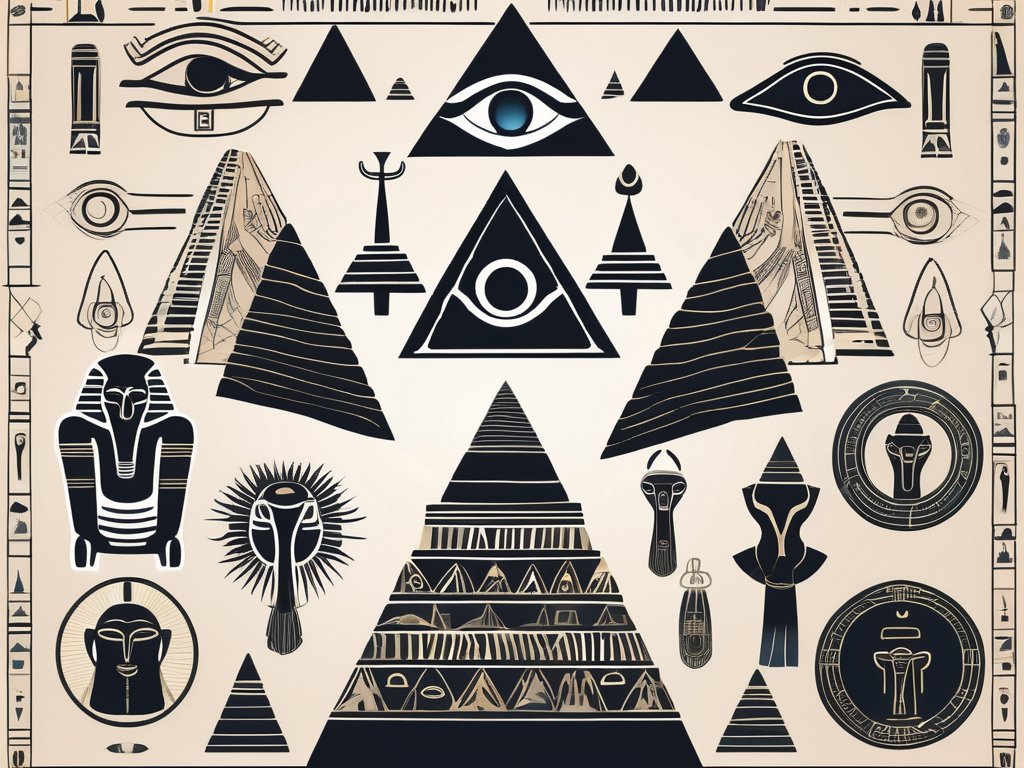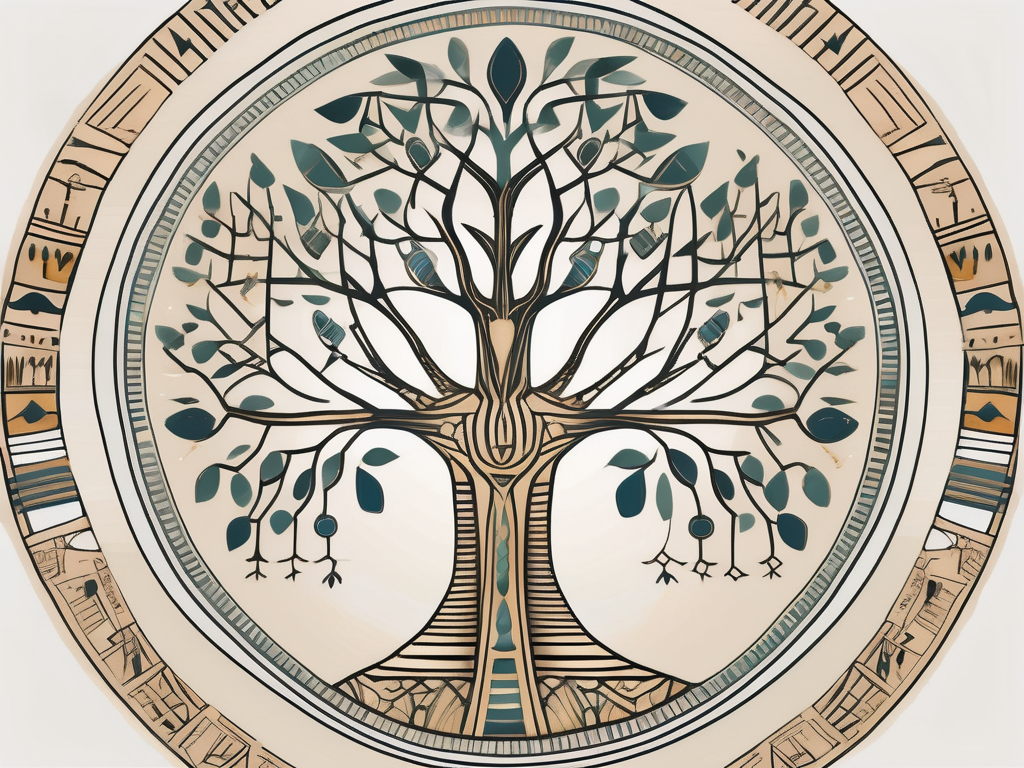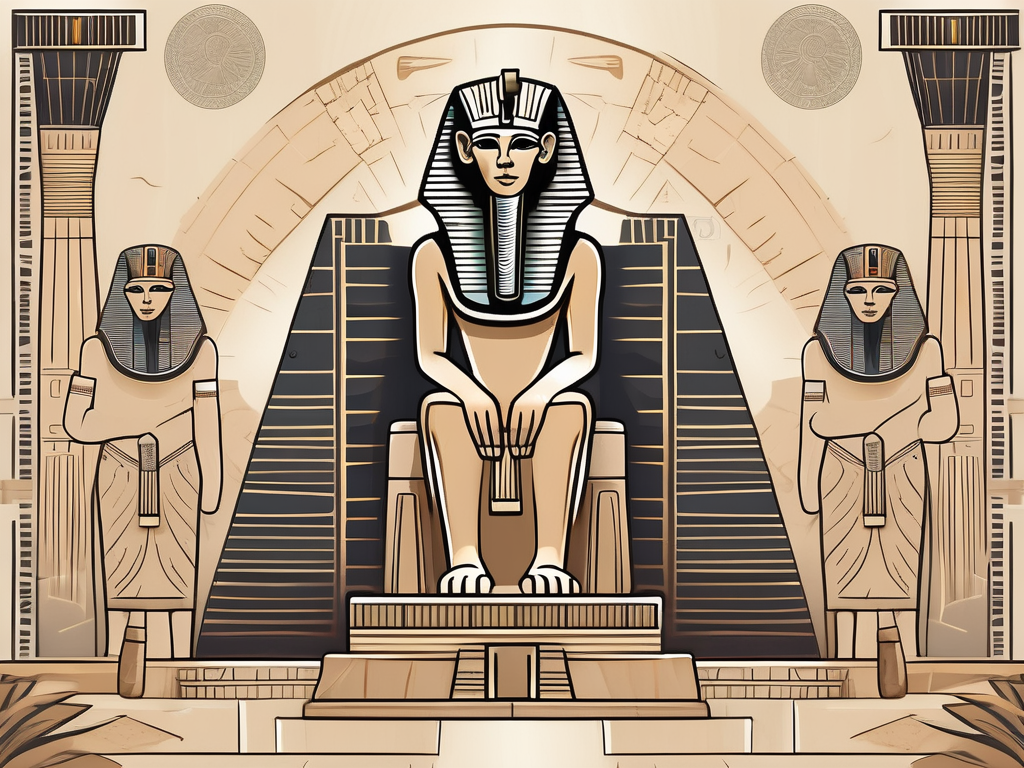Ah, the mysterious Duamutef, one of the lesser-known gods of ancient Egypt. In this article, we will explore the enigmatic world surrounding this deity and uncover the secrets that lie beneath. Get ready to embark on a journey deep into Egyptian mythology!
Understanding Duamutef: An Overview
Before we delve into the complexities of Duamutef, let’s start with a basic understanding of who this god is. Duamutef is one of the four sons of Horus, the mighty god associated with protection and the afterlife. Each son of Horus had specific roles, and Duamutef’s responsibilities were rather intriguing.
Legend has it that Duamutef was the protector of the canopic jar that housed the stomach of the deceased, ensuring its safekeeping for eternity. But there’s more to Duamutef than just being a guardian of an internal organ. Let’s unravel the fascinating world surrounding this deity.
When it comes to Egyptian mythology, Duamutef played a crucial role in the journey to the afterlife. Believed to have a jackal’s head, he was associated with the east, one of the cardinal directions representing rebirth and renewal. This connection to the east symbolized Duamutef’s role in guiding souls towards their new beginnings.
Furthermore, Duamutef was also considered a protector against harmful spirits and demons. Worshippers sought his divine intervention to ward off any malevolent forces that might impede their loved ones’ journey in the afterlife.
Like any deity, Duamutef had his own symbolism and iconography. Apart from his distinctive jackal head, Duamutef was often depicted standing upright, holding the all-important canopic jar in his hands. This representation emphasized his role as a guardian and protector of the deceased’s stomach.
Interestingly, Duamutef’s association with the four sons of Horus also carried symbolic significance. The four sons were believed to represent the cardinal directions, with Duamutef specifically representing the east. This connection with the east reinforced his connection to rebirth and new beginnings.
But what about the other sons of Horus? Well, Hapi, the baboon-headed god, was responsible for protecting the lungs. Imsety, the human-headed god, safeguarded the liver. And Qebehsenuef, the falcon-headed god, watched over the intestines. Together, these four sons of Horus formed a powerful team, ensuring the preservation and protection of the deceased’s vital organs.
It’s important to note that Duamutef’s role as a protector extended beyond just the physical realm. He was also believed to guard the deceased’s spiritual essence, ensuring that it remained intact and unharmed during the journey through the afterlife.
As we explore the intricacies of Duamutef’s mythology, it becomes clear that he was not just a deity associated with the afterlife, but a multifaceted god with various roles and responsibilities. From guiding souls towards rebirth to protecting against malevolent forces, Duamutef played a vital part in the complex belief system of ancient Egypt.
The Family of Duamutef
Now that we’ve scratched the surface of Duamutef’s nature and role, let’s shift our focus to his family life. After all, even gods have families! Duamutef shared a divine lineage that adds a layer of complexity to his story.
Parentage and Siblings
Duamutef was born to the powerful Horus and the goddess Isis, making him part of a divine lineage that spanned generations. As the son of such influential parents, Duamutef’s standing in the pantheon of Egyptian gods was elevated.
But let’s delve deeper into the parentage of Duamutef. Horus, his father, was not just any god. He was often depicted as a falcon-headed deity associated with the sky and kingship. Horus was revered as a symbol of divine rule and protection. With such a lineage, it is no wonder that Duamutef inherited a sense of regality and power.
On the other hand, Duamutef’s mother, Isis, was a goddess of immense importance in Egyptian mythology. She was associated with magic, fertility, and motherhood. Isis was revered as the ideal mother and protector. Her connection to Duamutef added a nurturing and caring aspect to his divine nature.
Furthermore, Duamutef had three brothers, each with their distinct roles. Imsety guarded the liver, Hapi protected the lungs, and Qebehsenuef looked after the intestines. Together, they formed a formidable team responsible for safeguarding the various organs of the deceased.
Imsety, the brother who guarded the liver, was often depicted as a human-headed deity. He was known for his compassionate nature and was believed to provide protection and healing to the deceased. Hapi, the brother responsible for protecting the lungs, was depicted as a baboon-headed god. He symbolized fertility and rebirth, ensuring that the deceased could breathe new life in the afterworld. Lastly, Qebehsenuef, the brother who looked after the intestines, was often depicted as a falcon-headed god. He was associated with purification and preservation, ensuring that the deceased could continue their journey without any hindrances.
Duamutef’s Relationship with Other Gods
In addition to his immediate family, Duamutef had connections and relationships with other prominent gods in the Egyptian pantheon. His father, Horus, was often depicted as a falcon-headed god associated with the sky and kingship. This familial tie brought Duamutef closer to the realm of royalty and divine rule.
But Duamutef’s relationship with other gods extended beyond his immediate family. He had a close bond with Anubis, the god of embalming and the afterlife. Anubis, often depicted with the head of a jackal, was responsible for guiding the deceased through the process of mummification and ensuring their safe passage into the afterlife. Duamutef and Anubis worked hand in hand, their roles intertwined in the sacred rituals of death and rebirth.
Furthermore, Duamutef’s connection to Isis, his mother, brought him into the realm of powerful goddesses. Isis was not only a revered deity associated with magic and fertility, but she was also known as the mother of Horus, making her a central figure in Egyptian mythology. Duamutef’s association with Isis elevated his status within the divine hierarchy, granting him access to the wisdom and power of this influential goddess.
In conclusion, Duamutef’s family played a significant role in shaping his divine nature and position within the Egyptian pantheon. From his powerful parents to his brothers and connections with other gods, his family ties added depth and complexity to his story. Understanding his familial relationships allows us to appreciate the intricate web of connections that existed within the Egyptian gods, showcasing the rich mythology and beliefs of ancient Egypt.
Duamutef and the Afterlife
Now that we’ve explored Duamutef’s family dynamics, let’s return to his role in the afterlife, which was a central aspect of ancient Egyptian belief. Duamutef’s duties and purpose shed light on the significance of his presence in the mythical realm.
The Protective Role of Duamutef
One of Duamutef’s primary functions was to protect the canopic jar that held the stomach of the deceased. This role highlighted the importance of preserving the entire body for the afterlife journey, as each organ played a vital role in the individual’s spiritual transformation.
Duamutef’s protective role extended beyond the physical realm. It was believed that he shielded the deceased from any malevolent spirits or negative influences that could hinder their safe passage into the afterlife. His watchful presence provided a sense of security and comfort to those entering the realm of the dead.
Duamutef’s Association with the East
As mentioned earlier, Duamutef’s association with the east held great significance in Egyptian mythology. The east symbolized rebirth, rejuvenation, and new beginnings. By aligning Duamutef with this cardinal direction, the ancient Egyptians emphasized his role in guiding souls towards their next phase of existence.
In the intricate tapestry of the afterlife journey, Duamutef’s presence acted as a guiding light, leading the deceased down the path of renewal and rebirth. His association with the east assured them that their journey was in capable hands.
Worship and Rituals of Duamutef
Now that we’ve explored Duamutef’s role in the afterlife, let’s turn our attention to the worship and rituals dedicated to this god. From grand temples to elaborate ceremonies, Duamutef held a place of reverence in the hearts of the ancient Egyptians.
Temples and Shrines Dedicated to Duamutef
Throughout ancient Egypt, numerous temples and shrines were built to honor Duamutef. These sacred structures served as focal points for worship and offered a space for devotees to connect with the divine presence of Duamutef.
One notable temple dedicated to Duamutef can be found in Dendera, where he was revered alongside his brothers. Devotees would make pilgrimages to these places of worship, seeking blessings and divine intervention in their lives.
Ancient Egyptian Rituals Involving Duamutef
Rituals played a significant role in Egyptian religious practices, and Duamutef was no exception. In various ceremonies, the canopic jars that housed the organs of the deceased were ritually cleansed, anointed, and resealed to ensure their continued protection by Duamutef and his brothers.
These ceremonies allowed the ancient Egyptians to actively participate in the preservation of the deceased’s body, symbolizing their belief in the importance of maintaining the physical form for the afterlife journey. Duamutef stepped into the spotlight during these rituals, garnering reverence and adoration from the worshipers.
Duamutef in Modern Culture
Now, let’s take a leap forward in time and explore the influence of Duamutef in modern culture. Despite the passage of centuries, the legacy of this enigmatic god continues to resonate in various artistic and literary forms.
Duamutef’s Influence on Literature and Art
Throughout history, writers and artists have drawn inspiration from the rich tapestry of Egyptian mythology, and Duamutef’s mystique has not gone unnoticed. References to this deity can be found in various works of literature and art, creating a lasting impression on audiences around the world.
From novels and poems to paintings and sculptures, the enigmatic nature of Duamutef has captivated the imaginations of creative minds. His iconic depiction and symbolism continue to inspire awe and intrigue, breathing life into stories and visuals that transport us back to the ancient world.
The Contemporary Relevance of Duamutef
While ancient Egypt may seem distant and disconnected from our modern lives, the presence of Duamutef still holds contemporary relevance. The themes of protection, guidance, and rebirth that Duamutef represents resonate with individuals seeking solace, support, and new beginnings.
Whether finding comfort in the idea of divine protection or drawing inspiration from the symbolism of the east, people today can find personal meaning in the ancient deity’s story. This enduring relevance showcases the timeless appeal of ancient gods like Duamutef.
In Conclusion
The enigmatic Duamutef, with his intriguing role in Egyptian mythology, stands as a fascinating testament to the rich tapestry of ancient beliefs and traditions. From his position among the sons of Horus to his symbolic association with the east, Duamutef guided the departed on their afterlife journey, providing protection and highlighting the importance of preserving the physical form for spiritual transformation.
While the temples and rituals dedicated to Duamutef have faded into the annals of history, his influence continues to be felt in the realms of art, literature, and personal spirituality. The enduring appeal of this once-mysterious god reminds us of the timeless fascination we have with the gods and goddesses of ancient civilizations.
Take a moment to ponder the secrets of Duamutef, and perhaps you too will find yourself captivated by the enigma of this Egyptian deity.












